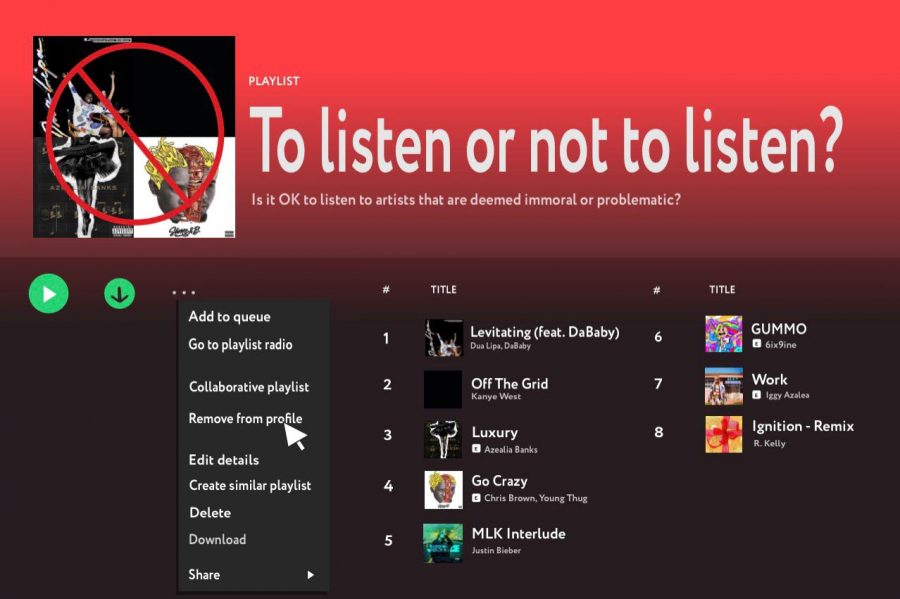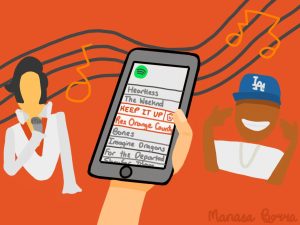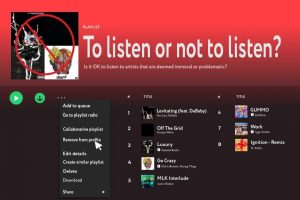Separate the art from the artist
Various artists have faced scandals and backlash in their careers, but does that degrade their music as well and make it wrongful to listen to them? The Sidekick staff writer Shrayes Gunna thinks an artist’s problematic background shouldn’t prevent a person from listening to what they desire unless the content reflects the problematic stances.
October 1, 2021
There is one constant within each emotion I process, math problem I laboriously solve and soothing shower I take. There’s a place I visit in my most troubling times that I return to at my highest of highs.
I know, it’s paradoxical, but there’s a familiarity in its tone.
The constant? Music
The place? The Spotify playlist that I load with the hundreds of melodies I cycle through on a daily basis.
Music is a refuge many seek: the same grounding, consistently enjoyable experience every single time. However, in the unrelenting search for the perfect song, comes the question of whether it is OK to listen artists who have been deemed problematic for several reasons: racism, homophobia, sexism, ableism or other forms of discrimination.
As social media platforms continue to forge insurrections of social activism, self-proclaimed activists continue to criticize more and more fans of celebrities for supporting a problematic artist. These situations have become the norm and rise in number with larger artists being brought into the spotlight and interrogated for actions or words that were perpetrated in the past.
For instance, DaBaby, a rapper who was beginning to pave his way in the music industry, was recently ‘canceled’ for his openly homophobic and misogynistic comments during a live performance at the Rolling Loud music festival in Miami.
The list of artists with similar stories doesn’t just end there.
Kanye West.
Azealia Banks.
Chris Brown.
Morgan Wallen.
And it goes on.
Though it’s not apt to reinforce the platform and the words of problematic influences within society, listening to their music for the purposes of enjoyment is unharmful.
However, in the circumstance that a song by an artist expresses harmful rhetoric or affirms the dehumanizing stances of the artist, there should be no case in which society streams and supports that work of art. When we stream and buy music, we not only affirm the lyricism and stances of the song but we amplify its reach.
Streaming music doesn’t end at listening to the song, but we consume the messages and voices of the artists and it could potentially influence us—a situation in which problematic artists can be detrimental to our character.
“Everyone takes away from the music that they listen to,” Coppell High School junior Neha Vakkadala said. “[It] depends on the person and how they perceive [the] music.”
There is one common phrase used to justify these instances that is often twisted: the notion of separating the art from the artist. Though it should be recognized that this concept is admissible, when utilized to justify streaming problematic songs it can be ignorant. Their words have taxing implications for the groups of people that are being targeted in such music.
By perpetuating notions of separating the art from the artist or that streaming has no real-world implications, we are openly negligent to the adverse effects of our actions. Although the phrase can be permissible in determining whether to stream or not to stream problematic artists, we should be cautious in streaming the problematic fruits of those artists.
There isn’t a clear line in the sand and or signage in our periphery that lets us know to refrain from streaming hurtful songs, but we should acknowledge the potential ramifications of the words we consume and the tones we allow to diffuse in our communities.
Follow Shrayes (@shrayesgunna) and @CHSCampusNews on Twitter












Angelina Liu • Oct 1, 2021 at 11:41 pm
Love this column!!